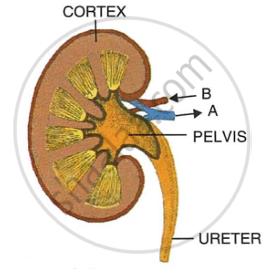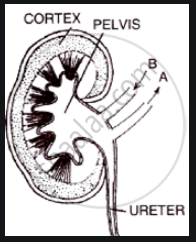Advertisements
Advertisements
Question
The kidneys in human beings are a part of the system for ______.
Options
nutrition
respiration
excretion
transportation
Solution
The kidneys in human beings are a part of the system for excretion.
Explanation:
The excretory system of human beings includes a pair of kidneys, a pair of ureters, a urinary bladder, and a urethra.
APPEARS IN
RELATED QUESTIONS
Match structures given in Column I with functions given in Column II.
| Column I | Column II | ||
| (i) | Stomata | (a) | Absorption of water |
| (ii) | Xylem | (b) | Transpiration |
| (iii) | Root hairs | (c) | Transport of food |
| (iv) | Phloem | (d) | Transport of water |
| (e) | Synthesis of carbohydrates |
Give biological reasons for the following statements: There is frequent urination in winter than in summer
The Biological/technical term for The removal of nitrogenous wastes from the body
The diagram given below shows a section of human kidney. Study the diagram carefully and answer the questions that follow :

(i) Label the parts numbered 1 to 4.
(ii) Why does part ‘2’ have a striped appearance?
(iii) What is the fluid that passes down part ‘4’? Name the main nitrogenous waste present in it.
(iv) Mention the structural and functional units of kidneys.
(v) Name the two major steps in the formation of the fluid mentioned in Q.5 (a) (iii).
Write the functions of Ureter
Blood in the renal artery or renal vein (Which one has more urea ?)
Name an animal which absorbs oxygen through its moist skin.
State whether the following statement is true or false:
Some organisms store wastes in body parts.
Fill in the following blank with suitable word:
The organs which extract the nitrogenous wastes from the blood are ..........
Define excretion. Name the excretory unit of a kidney.
Name the main nitrogenous waste in the human blood. How is it removed from the blood?
In which of the following are the largest amounts of nitrogen excreted from a mammalian body?
(a) breath
(b) sweat
(c) urine
(d) faeces
The excretory organs in an earthworm are:
(a) nephridia
(b) nephrons
(c) raphides
(d) ureters
Write True (T) or False (F) for the following statement. Rewrite the false statement in the correct form.
Urine is devoid of blood cells.
Tick the most appropriate answer.
Quinine is used in the treatment of
Answer the following in detail.
Describe the process of urine formation.
Name the following:
The outer region of kidney containing the Bowman's capsule.
Name the following:
The vein in which urea concentration is maximum
Given below is a set of five terms. Rewrite the terms in their correct order so as to be in logical sequence.
Renal artery, urethra, ureter, kidney, urinary bladder.
Differentiate between the following pairs of term :
Renal cortex and renal medulla
Given below is a simplified diagram of the human kidney cut open longitudinally. Answer the questions that follow.
 |
- Define excretion.
- Why does the cortex of the kidney show a dotted appearance?
- Why does the medulla of the kidney show a striped appearance?
- Write two differences in the composition of the blood flowing through the blood vessels 'A' and 'B'.
Given below is a highly simplified diagram of the human kidney cut open longitudinally. Answer the question that follow:
Name the functional units of the kidneys.

The diagram below represents a mammalian kidney tubule (nephron) and its blood supply. Parts indicated by the guidelines 1 to 8 are as follows:
1. U-shaped loop of Henle
2. Proximal convoluted tubule with blood capillaries
3. Bowman’s capsule
4. Afferent arteriole from the renal artery
5. Glomerulus
6. Venule to the renal vein
7. Collecting tubule
8. Distal convoluted tubule with blood capillaries Study the diagram and answer the following questions in each case:
(i) Where does ultrafiltration take place?
(ii) Which structure contains the lowest concentration of urea?
(iii) Which structure contains the highest concentration of urea?
(iv) Which structure contains the lowest concentration of glucose?
(v) Where is the most water reabsorbed?
Explain the Term: Ureter
Name the Following
The division of the kidney which is light in colour and subdivided into conical renal pyramids.
Give Technical Term:
The organ in man concerned with maintaining water balance in the body.
Complete the following sentence with appropriate word:
Besides excretion, the kidneys also carry out the important function of ______.
Choose the Odd One Out:
Choose the correct option.
Visceral layer : Podocytes :: PCT : ________.
Choose the correct option.
The part of nephron which absorbs glucose and amino acid is ______.
Answer the following question.
State the role of liver in urea production.
Answer the following question.
Amphibian tadpole can afford to be ammonotelic. Justify.
Osmoregulation maintains the osmolarity of blood at about ______.
Bilirubin and Biliverdin are pigments which are ____________.
In a person the tubule part of the nephron is not functioning at all. What will its effect be on urine formation?
Explain the importance of soil for plant growth.
Name the following:
The main nitrogenous waste formed in the body.
Give two examples of the following:
Water-soluble vitamins
